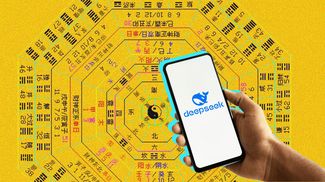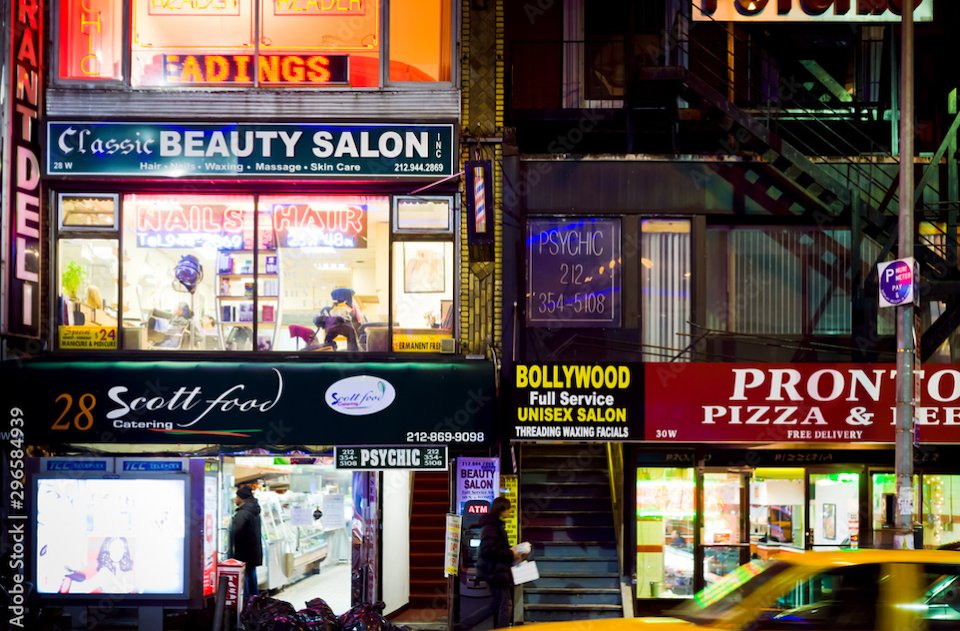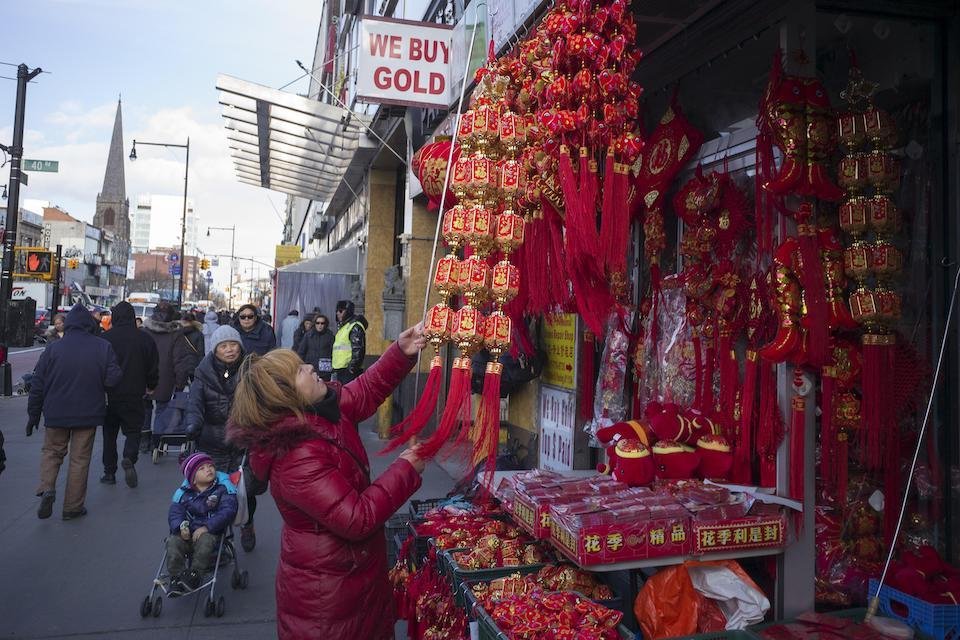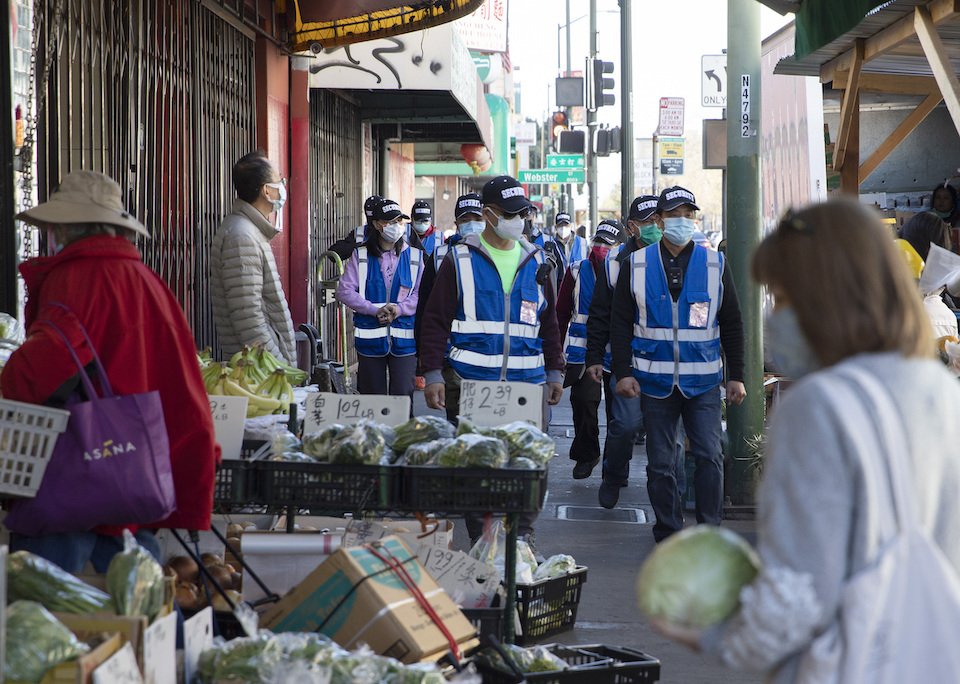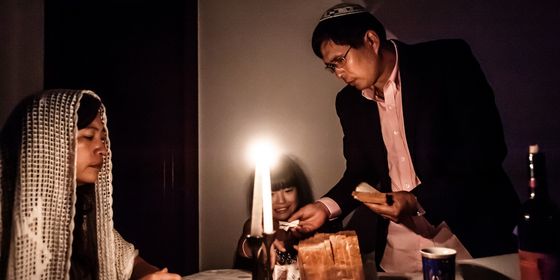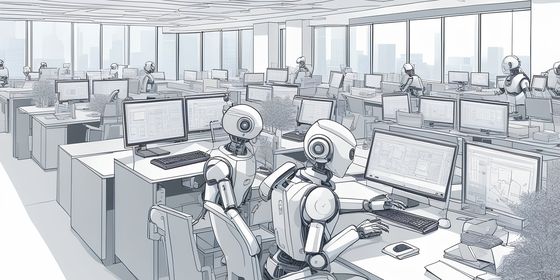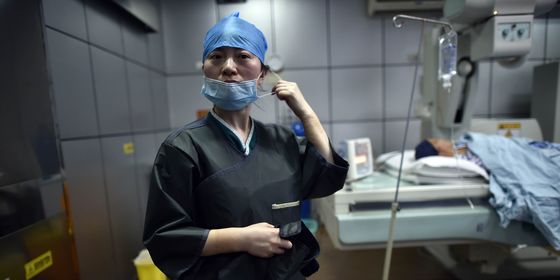An immigrant from China's Fujian province recalls her life as a masseuse in New York after the Atlanta shootings
On March 16, 2021, eight people died following shootings at three massage parlors in the Atlanta metropolitan area. Six of the victims were Asian women. The shootings became a catalyst for the Stop AAPI Hate movement. Demonstrations against anti-Asian discrimination erupted around the country.
Since the start of the Covid-19 pandemic in 2020, there have been at least 3,800 anti-Asian racist incidents in the United States. Nearly 70 percent of the victims have been women.
There are countless Chinese massage parlors in Chinese enclaves across America, and countless Chinese women working in those parlors. Unlike exchange students with their TOEFL scores, these massage workers typically have only a junior high or high school education. Some may not have come to the US through legal avenues.
In this episode, we interview one of these women, named Coco. Coco left Changle, Fuzhou province, in 2015, when she was 21 years old. She illegally entered the US and came to Flushing, a neighborhood in New York City that is the largest Chinese neighborhood in the US. Life there is hardly distinguishable from life in China. Coco worked in Flushing’s massage parlors for four years.
-1-
Growing up in Changle, Fuzhou
My parents had three girls in a row. They didn’t stop having kids until my brother was born.
I didn’t get into senior high school, so I started working whatever jobs I could—I was a receptionist, then a cashier. I never enjoyed studying, and could never remember what my teachers taught me.
Of the 40 students in my grade, more than 20 of us didn’t go on to senior high. Around 10 or so ended up coming to the United States, including seven or eight boys and two or three girls.
I left China when I was 21, because if I had kept working odd jobs in Fujian, the most I could have made was 3,000 yuan a month. So my parents asked if I wanted to leave the country, and I said okay.
-2-
Age 21 - 23: Illegal entry, service work, paying off debt
We found a rather well-known “snakehead” to smuggle me across the border.
The first leg of the journey was by ship. There were 30 or 40 people smuggled in each batch. The boats were bound for countries bordering the US, and we had hard biscuits and instant noodles for almost every meal on board.
We slept in the ship’s hold. We’d put down some grass mats or a rug and sleep directly on the boards.
After a month on the ship, we arrived in a small country and started trekking over the mountains. The routine was just like going to work: We’d wake up at 8 or 9 in the morning and walk until around 8 at night. If nobody said they were tired, then we just kept going.
Finally, near a Mexican border town, we stopped at a tall wall with thin slits. A person ran ahead of us, and we followed. My group did alright sneaking over, but another group saw people on the wall raking the area with gunfire as they were running over.
Once we were over, the smuggler found a Chinese-operated vehicle to take us to a residential building. Once your relatives came and paid the balance on the fee, they’d let you go.
Read more first-person China stories:
- My Mother Was a Sex Worker
- The Myanmar Brides Trafficked to China
- The Influencers Helping Trafficked Women Return Home
My dad’s friend dropped me off in Brooklyn, then I was free. At first, I went and worked as a restaurant hostess in Connecticut, making around 3,300 dollars a month. I usually sent 3,000 dollars back home and spent the other 300. I had to send a lot of money back to pay the interest on my debt to the smugglers: the fee was 600,000 RMB, with 10 percent interest each month—6,000 dollars a month in interest alone.
The most expensive thing I bought myself was an iPad, for 400 dollars. I’m still using it to this day. I didn’t have any other source of entertainment. When I got off work I’d play games my iPad for a bit, and on my days off I'd play the whole day.
-3-
Age 23 - 26: Chinese massage parlors, police entrapment
I came back from Connecticut to New York and started looking for a new job. A friend told me I could try massage work, since I was so young. It wouldn’t be as hard as restaurant work and I could make more money.
In this line of work, the younger you are, the more people want you to give them massages. Men will think, if we’re going to be there chatting, and it costs the same no matter what, why would I pick an older woman?
I worked about two years at the first massage parlor, and a year and a half at the second one. The first parlor was raided three times because competing massage parlors would report us, so I found another little parlor to work in. The owner there was a decent woman, so I stayed.
The police here have many tricks: They would ask the customers how much it was for a handjob. In reality, we never did that kind of thing. But the police would set these types of traps. The customers would answer in all honesty that an hour of massage was 35 dollars, tip was 20, and nobody ever asked me how much it was for a handjob.
Then they would ask the girls whether they had licenses. They didn’t. And then the girls would get locked up for a night. There were no beds in there, and if there were they were given to the older detainees to sleep on. All they had to eat was moldy bread and rotten apples. After being locked up for a day they had two choices: taking a civics class, and or doing community service for a certain number of hours.
I was incredibly lucky: One day, I had a client scheduled, and he said he was downstairs getting a milk tea. I said I’d come down and meet him. When we came back from getting milk tea, the parlor was packed with police officers. My friend gestured for me to hurry up and leave.
So the client and I got out of there and went to the cinema. They all got taken into custody, and we saw a movie—I’d say that was pretty lucky.
Later on, the owner found out why they raided us three times. It was because a former employee had jumped ship and opened up her own place, and she was reporting our place in order to get our business. So the owner went out and had a meal with her, and things settled down from then on.
-4-
Customers, tips, sexual and non-sexual services
Americans usually leave great tips, especially the ones coming to New York on vacation. Because my English was pretty good, the laowai often gave great tips, sometimes 40 or 50 bucks, even a hundred at times.
An hour's massage was 30 dollars, which I split evenly with the owner. The employees kept their own tips.
I worked hard at keeping some banter going with the clients, because my massage skills were not so great to start with. But if I chat with the customers, I could sometimes get better tips than the other workers. This sometimes led to misunderstandings, because sexual transactions sometimes do happen in this industry.
Customers gave tips in the main room, where everyone could see. The others would think, you've just started out, so why are you getting such good tips? People imagine all kinds of things.
I had a female coworker named Lala, who never accepted any female clients. We all knew what that meant.
Our boss had told me before that nothing of a sexual nature was allowed in her business. But Lala was an old employee, so the boss couldn't bring herself to fire her. And she didn’t take things too far. As long as she was bringing in stable, long-term customers, she could do a bit of erotic stuff.
The boss can't go barging in demanding why you’re doing this or that. The girls want to make money, and if you don’t let them, they’ll go elsewhere and leave the boss high and dry. As long as you don’t take it too far, bosses will usually turn a blind eye.
At the first shop where I worked, I never heard any questionable sounds, so maybe they did a good job of keeping things under wraps.
The second place had doors that didn't lock, so there was no way to engage in sex work. But people definitely still gave handjobs for the tips, and we never asked. There were also customers who would ask me for sexual services, and I’d say, why don’t you go ask one of the streetwalkers? He’d say, those are too old—last time he went over, an older woman stopped him, but he turned down her offer of 40 dollars for sex. We both laughed.
I had quite a few regulars who were men. One of my male clients seemed to like me—at any rate, he brought me a gift whenever there was a holiday.
He gave me Swarovski necklaces, earrings, the like. If he'd given cheap gifts, I wouldn’t have kept talking to him for as long as I did.
The sisters who worked with me often got plastic necklaces, little trinkets the laowai got for a couple dollars to trick them.
There was another customer who chose me almost every time he came. He was a Jewish dentist. He always came sharply dressed, wearing gold-rimmed glasses. He was maybe 1.8 meters tall and heavy-set, with a big belly.
He would take his phone out and look up schools near Flushing. He said, if you register at this school, I’ll reimburse your tuition. I said, but what if I register and then you stop coming? Where will my tuition money come from then?
He said don’t worry: as long as you enroll, I’ll reimburse your tuition.
He gave really good tips. Aside from the 100 dollars he gave me at our first session, he once gave me 200 dollars for two hours of massage. Between the tip and the base charge, I ended up making 230 dollars for those two hours.
What was really interesting was, I often saw him strolling around the neighborhood with different Chinese women. They all seemed to be about 40 years old, and very elegantly dressed.
Another customer was an alcoholic from Taiwan. He would come over after drinking, totally plastered. He asked me, do you know Teresa Teng? I said I did, I’ve even sung with her, and he burst out laughing.
I got into a singing contest with him then and there. He sang, and I sang, until my boss came and pounded on the door. She asked, “Are you both crazy?“”
I said yes, we're both crazy.
When he finished singing he asked me if I’d give him a handjob. I told him to get lost. I said, when you come here I have to sing with you—my throat is killing me. Why don’t you take your go across the street for sex for 80 dollars? Instead, you come here for a 50-dollar massage. Are you crazy?
He laughed and said that my customer service was terrible. And I said, if my customer service is so bad, why do you still come looking for me? Aren’t you crazy?
-5-
Green card marriage
None of the girls at the massage parlor had documentation. Some of them found a laowai to marry, just to get papers. I don't know whether they were happy.
Take an old boss of mine—she was uglier than you can imagine. She was in her 70s, and insisted on marrying an old white guy in his 60s or 70s, who was fat and impotent. She found herself another laowai, a farm worker. Every week the two of them would book a hotel room together.
The funny thing was, that farm worker never brought her any gifts or anything. He’d just pluck a few catties of corn from the farm and bring them to her. I almost died laughing over that.
Unlike some of her coworkers, Coco didn’t marry an American for legal status. Instead, she got her green card through a sham marriage. She was committed to not dating until she paid off the 90,000 USD she owed to her smuggler. This took two years and a half. After that, Coco had three romantic relationships in the US.
-6-
Three relationships and a marriage
My first relationship after coming to the US was with someone I met while working as a masseuse. We were together almost six months.
He wanted me to stop giving massages. I said, fine. I want to do nails, but you make almost no money at first. Are you going to pay my living expenses while I learn the nail business? I didn’t hear a peep from him, so we broke up.
My second boyfriend was from Guangdong, a hairstylist. We were also together for about six months. He wanted to get married, but I didn’t, so we also broke up.
After that there was another guy I met online. He was too ugly when we finally met in person, so I didn’t get with him.
I got my documents by marrying someone on paper. My sham partner was a tall, thin guy from Mawei, Fujian. At the outset, he asked for 40 grand to help me get my papers.
He was a decent person, an honest guy. He told me he was going to use the money to go into business. I said, why should I care? The money’s yours; you do what you want with it.
We got our marriage certificate, and then he helped me apply for my green card. To start, they gave me a temporary two-year green card. That was when Obama was still in office. There’s usually an interview when you switch from a two-year card to a ten-year one, but maybe it was because Obama was about to leave office, they just gave me a ten-year green card when the time came, without an interview. Right after that, Trump came into power.
I have a few requirements for my future husband: First off, he has to be legal. Second, he can’t be in debt. No drugs, no gambling, no prostitutes. If he does visit prostitutes, he just can’t let me catch him.
-7-
After the epidemic: Unemployed for a year, then back to restaurant work
When the pandemic started, all the massage parlors closed. I was out of work for a whole year.
Because American bank accounts can get audited if you deposit more than 10,000 USD, I didn’t put that much money in mine. I carried 3,000 or 4,000 on my person, and kept 3,000 or 4,000 at home. I kept another 8,000 or so in my bank card. Anything beyond that, I spent buying purses.
Actually, my biggest expense each month was rent, at 650 dollars a month. I wasn’t too picky about what I ate: I had plain rice every day, with some vegetables. I bought some meat when I could afford it.
Before, workers had their pick of bosses; now, bosses get to pick the workers. A friend told me about an opening at a restaurant. The work was there, so I went.
Now I make 3,000 dollars or so per month, definitely less than what I made giving massages. When I was giving massages, I made 6,000 in the summer and 3,000 in the winter.
It was a woman who referred me to this restaurant job, so I won’t go looking for any more massage work in this neighborhood. If it came out that I was looking for massage work, the other restaurant workers might gossip about the woman who referred me—what did she do before, and why would she know a massage worker?
-8-
Fujian customs and my parents
There are very few massage workers from Fujian; most are from the North. When I worked in massage parlors I was afraid to tell the others I was from Fujian. None of my family members know that I used to be a massage worker.
The first two years in America, I missed my parents. But after I paid off my debt, they kept asking me for money. I knew that they wanted to spend the money on my younger brother.
I owe my parents gratitude for raising me—but first, you didn’t educate me, and second, you never cared about me. So later on I stopped missing my parents so much.
I have a pretty good relationship with my oldest sister. She’s already gotten married, but my parents took the wedding cash gift from her in-laws and never returned it, so she also stopped speaking to my parents.
She can understand how I feel about being continuously shaken down for cash to give to our brother. My sister is resigned to her fate, but she told me to avoid giving my wedding cash to my parents no matter what.
My parents would press me to get married, because in Fujian marriages involve a "brideprice." Men would give a few hundred thousand: the market price was 488,000 or 388,000 yuan. If a girl gets married in the US, the cash gift is generally 88,000 dollars.
I think money is the only useful thing. Sometimes, when I'm tired, I'll come home and see that I have a few grand saved up in my bank account, and it’s a good feeling.
I’m not saying I don’t send money to my parents. I always send some for living expenses, but don’t even think about asking for more. Because they keep taking it for my brother, even though I paid back the hundreds of thousands spent on bringing me to America all by myself. Why should I help them repay my brother's debts?
My legal status now allows me to return to China, but I haven’t made the trip yet. Because in Fujian, the first time you go back from overseas, you have to spend a lot of money: Including the farewell gifts others gave you when you left, maybe one or two hundred kuai; This farewell money has to be paid back in US dollars. Then you have to host a banquet as well. My dad calculated that it would take around 30 grand, in US dollars. If people find out that you came sneaking back to avoid spending that money, they’d laugh you out of town. Sometimes I envy, for example, people from the Northeast or other places. When they go back they only need to bring some gifts, while in Fujian we have to give out both cash and gifts.
This year, if I save 30 grand by Spring Festival, I’ll go home to celebrate.
Back in the day, Coco had been smuggled over by a fellow Fuzhou-ese; she was met in the US by someone from Fuzhou, and got her first job at a Fuzhou-owned restaurant. Even now, she is bound by Fuzhou customs that value men over women, and require generous payments to relatives and neighbors when she returns from America “in silk robes.” Especially living in an Asian enclave like Flushing, Coco — like the victims of the Atlanta shootings — is very cut off from public life in mainstream society.
They may not have come or stayed through legal means, but they wanted only to live, to change their lots in life.
Flushing has a large Chinese population; outside of clients, I rarely have contact with laowai. I think it’s good that there were such big demonstrations against anti-Chinese sentiment, since it shows that Chinese people have become a little stronger—they don’t stay out of the public eye like they used to.
I was scared when I heard the news. Scared, because America really does have all kinds of people—what if someone with racist feelings hears the story and copies it? I was scared that killers would murder Chinese people, who were weaker than they were. He might think that Chinese women can’t effectively resist. The women in the massage parlors would think that everyone coming in is a customer. They’re thinking about earning money, and wouldn’t suspect that you might be a killer.
I think that Black people might have more unity than Chinese people, considering they’ve supported each other for so many years from the era of slavery to the present. If they encounter racial discrimination, they become unified all the more.
Though I have my green card, I haven’t taken the citizenship test yet. So I still think of myself as Chinese.
But since I earn money in the US, there’s no way I can take US money and say bad things about the country. I simply can’t say those things, so I think half of me is Chinese and half is American.
Produced by Jingyuan Wang
___
This story is published as part of TWOC’s collaboration with Story FM, a renowned storytelling podcast in China. It has been translated from Chinese by TWOC and edited for clarity. The original can be listened to on Story FM’s channel on Himalaya and Apple Podcasts (in Chinese only).

